2025新教材沪教版七年级英语(下册)电子课本(最新高清pdf版-可下载打印)
开心田螺
2025-02-28 18:10:11
0次
沪教版七年级英语(下册)电子课本可以方便大家随时随地预习或复习课本知识,为此,我们找到了沪教版七年级英语(下册)新教材电子书教材的全部内容,以高清图片的形式呈现给大家,希望能够提高大家的学习效率。
如需全套电子课本PDF版,请关注公众号“桃李百科”回复:“电子课本”
沪教版七年级英语(下册)新教材电子课本在线阅读(此为截图版,获取是高清版)

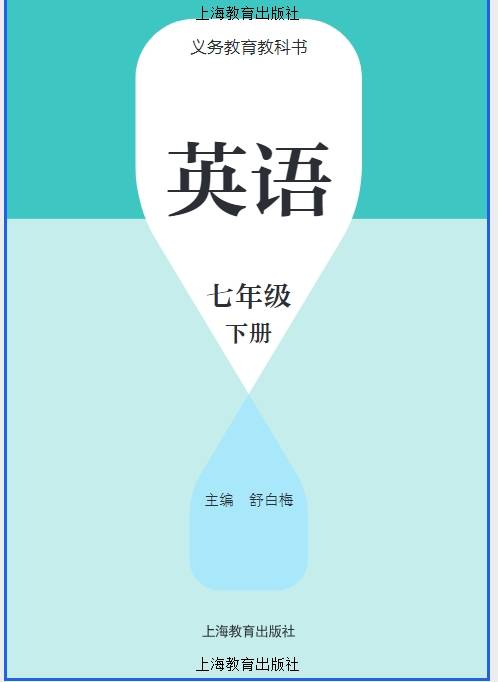
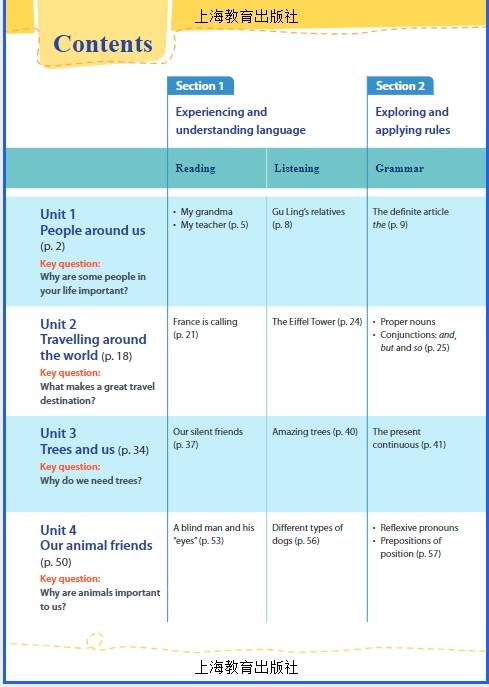
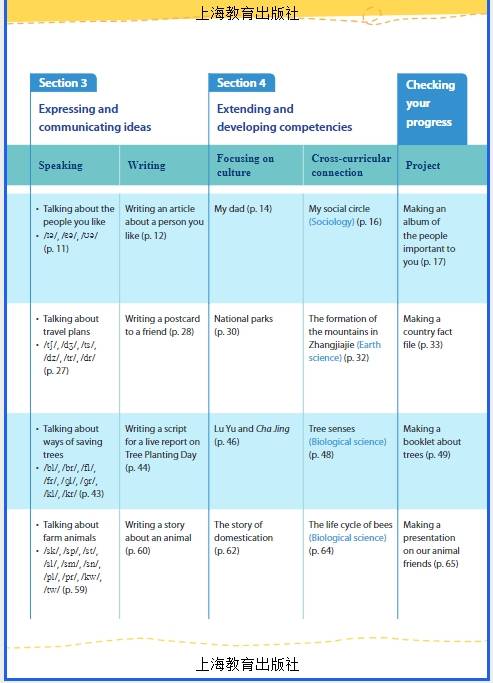
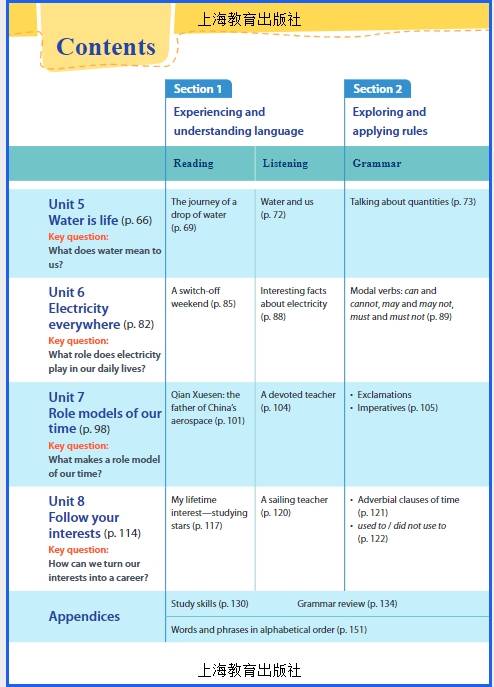
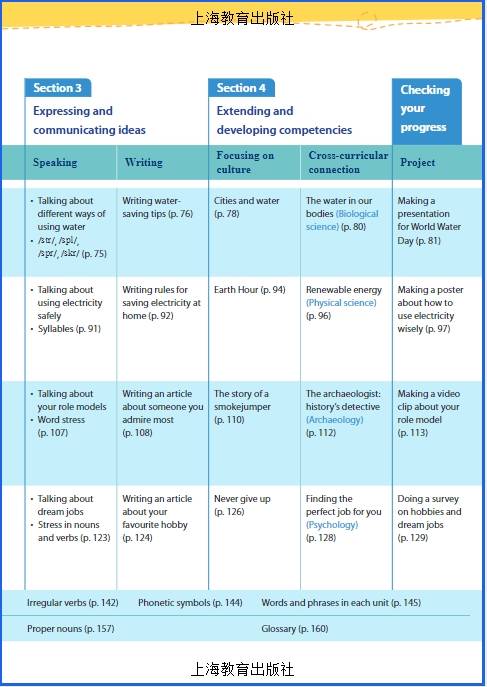
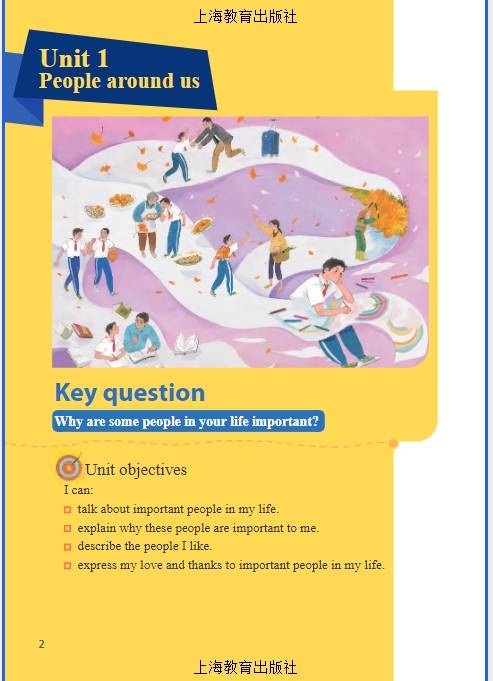
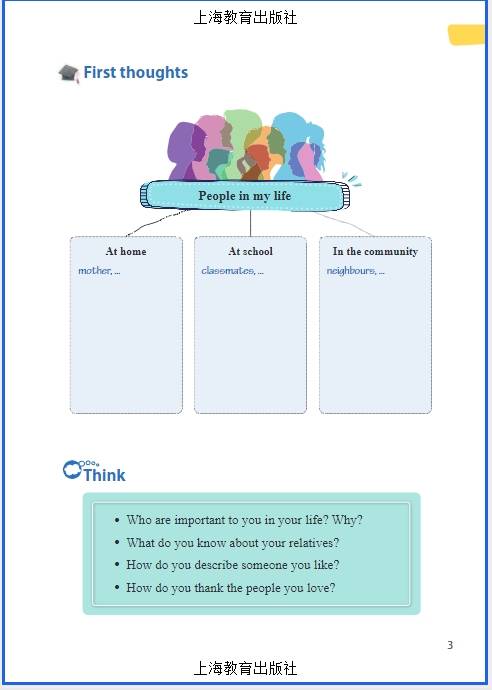
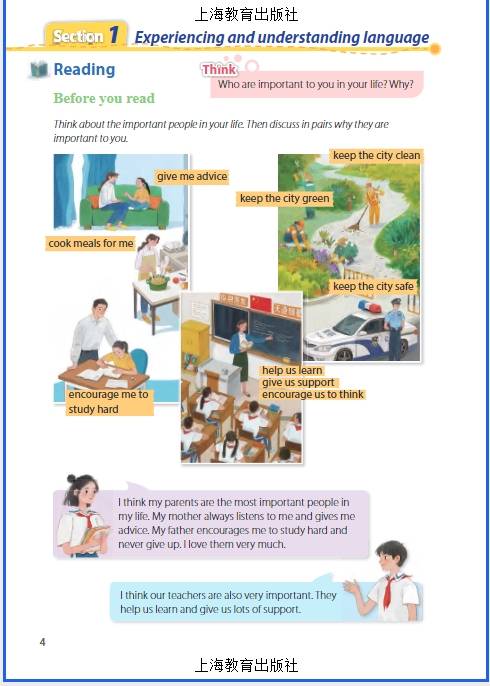
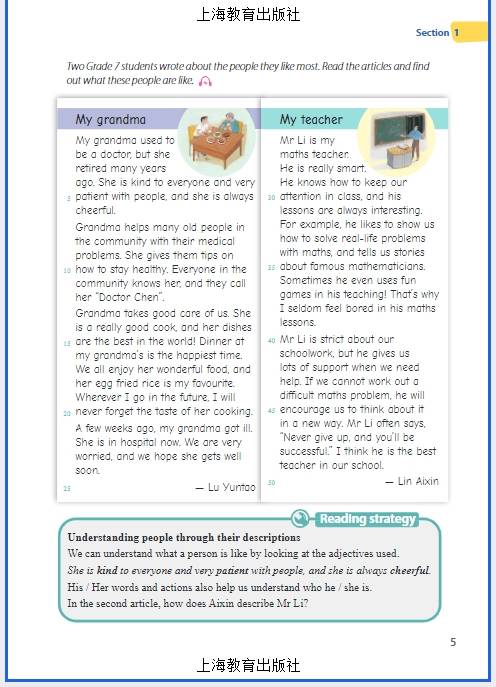
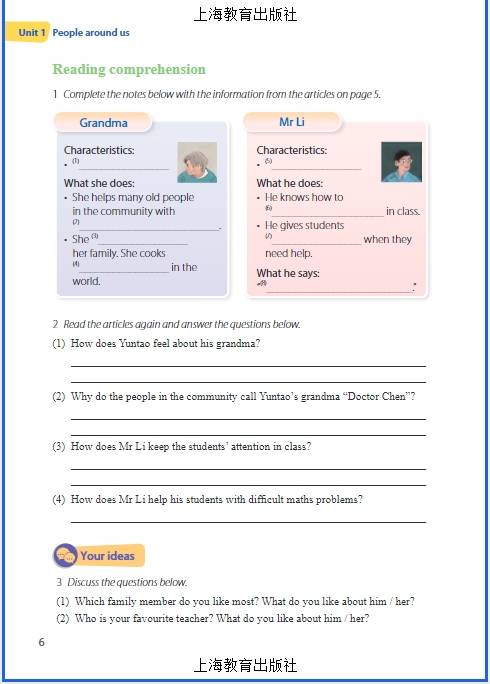
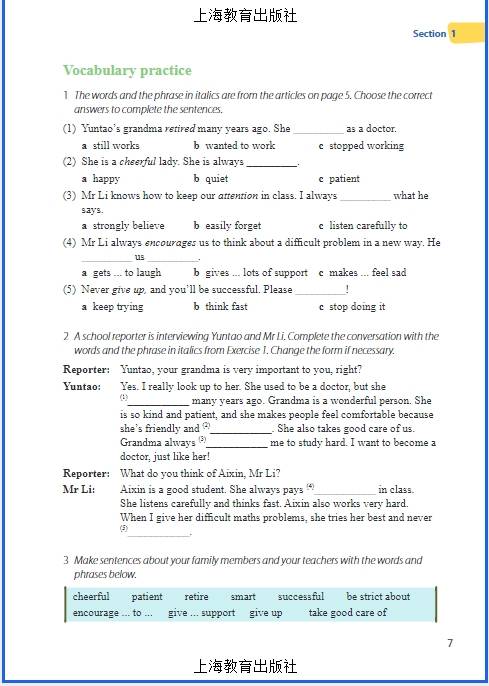
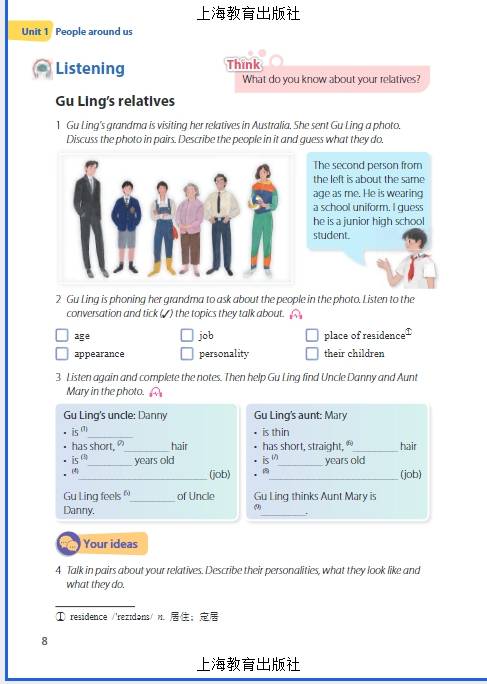
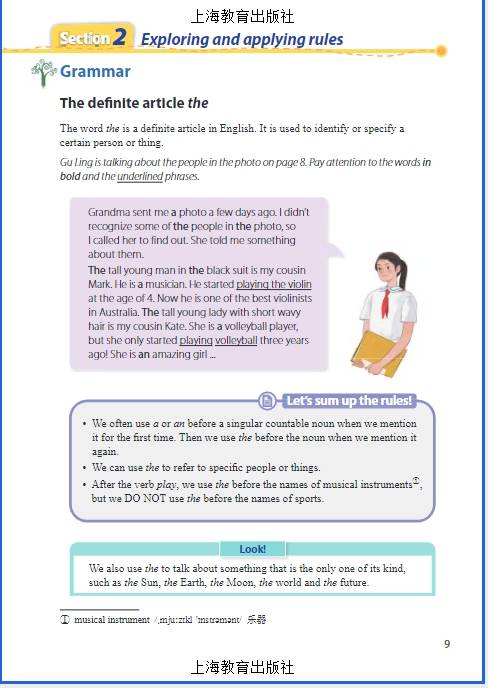
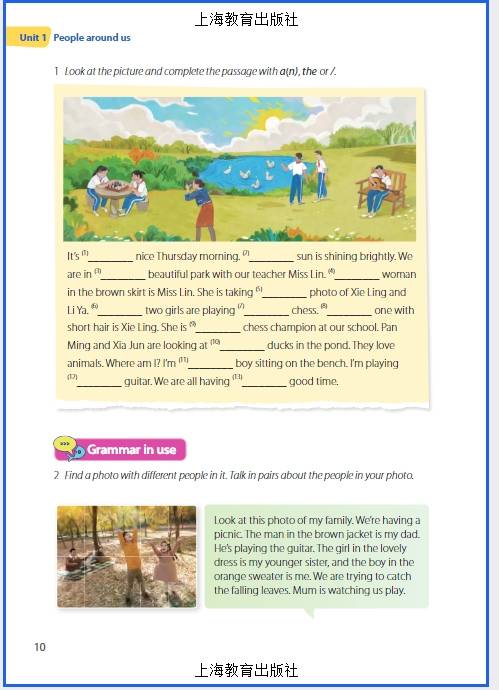
2025 新教材冀教版七年级英语(下册)单元总结
Unit 1 School Life
一、词汇
- 重点单词
- 学科类:science(科学),如 I like science because it's interesting.(我喜欢科学,因为它很有趣。);math(数学),math 在英式英语中常写作 mathematics;history(历史);geography(地理);art(艺术;美术);music(音乐)。
- 校园设施及活动:classroom(教室),classroom building(教学楼);library(图书馆),borrow books from the library(从图书馆借书);playground(操场),play football on the playground(在操场上踢足球);lab(实验室),science lab(科学实验室);club(俱乐部),如 English club(英语俱乐部);activity(活动),after - school activities(课外活动)。
- 其他:every(每一;每个),every day(每天);subject(学科),What's your favorite subject?(你最喜欢的学科是什么?);timetable(时间表);lesson(课;一节课),have a lesson(上课);begin(开始),begin 的同义词为 start,begin/start to do sth. 或 begin/start doing sth.(开始做某事);finish(完成;结束),finish doing sth.(完成做某事)。
- 词形变化
- 名词复数:classroom - classrooms;library - libraries;lab - labs;activity - activities。
- 动词第三人称单数形式:begin - begins;finish - finishes。
二、短语
- be good at(擅长),同义短语为 do well in,如 She is good at dancing. = She does well in dancing.(她擅长跳舞。)
- like...best(最喜欢……),What subject do you like best?(你最喜欢什么学科?)
- have...class(上…… 课),have a math class(上数学课)
- on the playground(在操场上)
- after school(放学后)
- from...to...(从…… 到……),from Monday to Friday(从周一到周五)
三、句型
- 询问最喜欢的学科: - What's your favorite subject?(你最喜欢的学科是什么?) - My favorite subject is English.(我最喜欢的学科是英语。) 还可以用 - Which subject do you like best? 来提问,回答类似。
- 询问课程安排: - What classes do you have today?(你今天有什么课?) - I have Chinese, math and English.(我有语文、数学和英语课。)
- 描述开始和结束时间: - When does your first class begin?(你的第一节课什么时候开始?) - It begins at 8:00.(它在八点开始。) - When do you finish school?(你什么时候放学?) - I finish school at 4:30.(我四点半放学。)
四、语法
- 一般现在时:表示经常发生的动作或存在的状态。当主语是第三人称单数(he/she/it 等)时,动词要用第三人称单数形式,即在动词原形后加 -s 或 -es。如:He likes reading books.(他喜欢读书。)She goes to school by bike.(她骑自行车去上学。)一般现在时的一般疑问句,若句中有 be 动词,将 be 动词提前;若有实义动词,借助助动词 do/does(主语是第三人称单数时用 does),动词还原为原形。如:Do you like music?(你喜欢音乐吗?)Does he go to school on foot?(他步行去上学吗?)否定句同样借助助动词,在助动词后加 not。如:I don't like math.(我不喜欢数学。)He doesn't like sports.(他不喜欢运动。)
- 特殊疑问句:以特殊疑问词(what、where、when、how、why 等)开头,对句子中的某一特定部分进行提问。结构为:特殊疑问词 + 一般疑问句语序。如:What time is it?(几点了?)Where do you live?(你住在哪里?)Why do you like English?(你为什么喜欢英语?)
Unit 2 Me, My Parents and My Friends
一、词汇
- 重点单词
- 家庭成员:father/dad/daddy(父亲);mother/mom/mummy(母亲);parent(父亲或母亲),parents(父母);brother(兄弟);sister(姐妹);grandfather/grandpa(祖父;外祖父);grandmother/grandma(祖母;外祖母);grandparent(祖父或祖母;外祖父或外祖母),grandparents(祖父母;外祖父母)。
- 人物特征及性格:tall(高的),反义词为 short(矮的);short(短的;矮的);long(长的);curly(卷曲的),curly hair(卷发);straight(直的),straight hair(直发);kind(和蔼的;友善的);friendly(友好的),be friendly to sb.(对某人友好);funny(有趣的;滑稽的)。
- 其他:look(看;看起来),look like(看起来像),What does he look like?(他长什么样?);love(爱;喜欢),love to do sth. /love doing sth.(喜欢做某事);work(工作),既可用作动词,也可用作不可数名词,如 My father works in a factory.(我父亲在一家工厂工作。)He has a lot of work to do.(他有很多工作要做。);job(工作),可数名词,如 She has a good job.(她有一份好工作。)
- 词形变化
- 名词复数:parent - parents;grandparent - grandparents。
- 动词第三人称单数形式:look - looks;love - loves;work - works。
二、短语
- look like(看起来像),如 The girl looks like her mother.(这个女孩看起来像她妈妈。)
- be kind to sb.(对某人和蔼),The teacher is kind to his students.(这位老师对他的学生很和蔼。)
- be friendly to sb.(对某人友好),We should be friendly to each other.(我们应该彼此友好。)
- live with sb.(和某人住在一起),I live with my parents.(我和我的父母住在一起。)
- a photo of...(一张…… 的照片),a photo of my family(一张我的全家福)
三、句型
- 询问人物外貌: - What does he/she look like?(他 / 她长什么样?) - He/She is tall and has short hair.(他 / 她很高,留着短发。)
- 描述家庭成员的工作: - What does your father do?(你父亲是做什么工作的?) - He is a doctor.(他是一名医生。)
- 表达对某人的喜爱:I love my parents very much.(我非常爱我的父母。)
四、语法
- 一般现在时描述人物特征和行为:在描述人物的外貌特征、性格特点以及日常行为习惯时,常用一般现在时。如:My sister is very kind. She often helps others.(我的姐姐很和蔼。她经常帮助别人。)He has curly hair and big eyes.(他有卷发和大眼睛。)
- 名词所有格:表示人或物的所属关系。有两种形式:
- 's 所有格:一般在名词后加's,如 Tom's book(汤姆的书);以 s 结尾的复数名词,只在名词后加 ',如 the teachers' office(老师们的办公室);不以 s 结尾的复数名词,仍在名词后加's,如 the children's toys(孩子们的玩具)。
- of 所有格:用于无生命的物体或较长的名词词组,表示所属关系,如 the door of the classroom(教室的门),the name of the boy(这个男孩的名字)。
Unit 3 Food and Drinks
一、词汇
- 重点单词
- 食物类:rice(米饭),不可数名词;noodles(面条),常用复数形式,a bowl of noodles(一碗面条);dumpling(饺子),可数名词;bread(面包),不可数名词;hamburger(汉堡包);hot dog(热狗);chicken(鸡肉;鸡),作 “鸡肉” 讲时是不可数名词,作 “鸡” 讲时是可数名词;fish(鱼;鱼肉),作 “鱼肉” 讲时是不可数名词,作 “鱼” 讲时,单复数同形,指不同种类的鱼时,复数形式为 fishes;vegetable(蔬菜),常用复数形式,vegetables;fruit(水果),作集合名词时,不可数,如 I like fruit.(我喜欢水果。),指不同种类的水果时,可数,如 There are many kinds of fruits in the shop.(商店里有很多种水果。)
- 饮料类:water(水),不可数名词;milk(牛奶),不可数名词;juice(果汁),不可数名词;tea(茶),不可数名词;coffee(咖啡),不可数名词。
- 其他:hungry(饥饿的),be hungry(饿了);thirsty(口渴的),be thirsty(渴了);would(will 的过去式;表示想要),would like(想要),would like sth. /would like to do sth. /would like sb. to do sth.;some(一些),用于肯定句,在表示请求、建议,希望得到肯定回答的疑问句中也用 some,如 Would you like some water?(你想要一些水吗?);any(一些;任何),用于否定句和疑问句。
- 词形变化
- 名词复数:dumpling - dumplings;vegetable - vegetables;fruit - fruits(指不同种类水果时)。
二、短语
- would like(想要)
- would like sth.(想要某物),I would like an apple.(我想要一个苹果。)
- would like to do sth.(想要做某事),She would like to go shopping.(她想去购物。)
- would like sb. to do sth.(想要某人做某事),My mother would like me to clean my room.(我妈妈想让我打扫我的房间。)
- have...for breakfast/lunch/dinner(早饭 / 午饭 / 晚饭吃……),I have bread and milk for breakfast.(我早饭吃面包,喝牛奶。)
- a glass of...(一杯……),a glass of water(一杯水);a bottle of...(一瓶……),a bottle of juice(一瓶果汁);a bowl of...(一碗……),a bowl of noodles(一碗面条)
- healthy food(健康食物);junk food(垃圾食品)
三、句型
- 询问对方想要什么: - What would you like?(你想要什么?) - I would like some noodles.(我想要一些面条。)
- 询问对方想吃 / 喝什么: - What would you like to eat/drink?(你想吃 / 喝什么?) - I'd like to eat a hamburger and drink some juice.(我想吃一个汉堡包,喝一些果汁。)
- 表达自己的饮食喜好:I like apples, but I don't like bananas.(我喜欢苹果,但我不喜欢香蕉。)
- 建议对方吃 / 喝某物: - Would you like some tea?(你想要一些茶吗?) - Yes, please. / No, thanks.(好的,请给我。/ 不,谢谢。)
四、语法
- 可数名词和不可数名词
- 可数名词:有单复数形式,前面可加 a/an 或数词修饰。变复数时,一般在词尾加 -s,如 book - books;以 s、x、sh、ch 结尾的名词,加 -es,如 box - boxes,watch - watches;以辅音字母 + y 结尾的名词,变 y 为 i 再加 -es,如 family - families;以 f 或 fe 结尾的名词,变 f 或 fe 为 v 再加 -es,如 knife - knives;还有一些名词的复数形式是不规则变化,如 man - men,woman - women,child - children 等。
- 不可数名词:没有复数形式,前面不能用 a/an 修饰,也不能直接加数词。表示数量时,常用 “数词 + 量词 + of + 不可数名词” 结构,如 a cup of tea(一杯茶),two pieces of bread(两片面包)。不可数名词作主语时,谓语动词用单数形式。
- some 和 any 的用法
- some:常用于肯定句中,表示 “一些”,可修饰可数名词复数或不可数名词。如:There are some books on the desk.(桌子上有一些书。)I have some milk.(我有一些牛奶。)在表示请求、建议,希望得到肯定回答的疑问句中也用 some,如:Would you like some coffee?(你想要一些咖啡吗?)Could you give me some advice?(你能给我一些建议吗?)
- any:常用于否定句和疑问句中,表示 “一些”,可修饰可数名词复数或不可数名词。如:There aren't any students in the classroom.(教室里没有学生。)Do you have any brothers or sisters?(你有兄弟姐妹吗?)在肯定句中,any 表示 “任何”,可修饰可数名词单数或不可数名词,如:You can ask me any question.(你可以问我任何问题。)
Unit 4 My Neighbourhood
一、词汇
- 重点单词
- 地点类:neighbourhood(街区;居民区);street(街道);road(路;道路);avenue(大街;林荫道);building(建筑物;楼房);house(房子);apartment(公寓套房);store(商店),同义词为 shop;supermarket(超市);bank(银行);hospital(医院);school(学校);park(公园);cinema(电影院),go to the cinema(去看电影);library(图书馆)。
- 方位介词:near(在…… 附近);next to(紧挨着);between(在…… 之间),常与 and 连用,between...and...(在…… 和…… 之间);behind(在…… 后面);in front of(在…… 前面),指在物体外部的前面,in the front of(在…… 前部),指在物体内部的前面;across from(在…… 对面)。
- 其他:live(居住),live in + 地点(住在某地),如 I live in Beijing.(我住在北京。);turn(转弯;转变方向),turn left/right(向左 / 右转);along(沿着),go along(沿着…… 走);find(找到;发现),过去式和过去分词为 found;miss(错过;想念);welcome(欢迎),Welcome to...(欢迎来到……)。
- 词形变化
- 名词复数:street - streets;road - roads;building - buildings;house - houses;apartment - apartments;store - stores;supermarket - supermarkets;bank - banks;hospital - hospitals;school - schools;park - parks;cinema - cinemas;library - libraries。
- 动词第三人称单数形式:live - lives;turn - turns;find - finds;miss - misses;welcome - welcomes。
二、短语
- live in(住在),如 They live in a big house.(他们住在一所大房子里。)
- near here(在这附近),Is there a bank near here?(这附近有银行吗?)
- next to(紧挨着),The bookstore is next to the school.(书店紧挨着学校。)
- between...and...(在…… 和…… 之间),The library is between the park and the hospital.(图书馆在公园和医院之间。)
- in front of(在…… 前面),There is a tree in front of the classroom.(教室前面有一棵树。)
- across from(在…… 对面),The restaurant is across from the cinema.(餐厅在电影院对面。)
- go along/down(沿着…… 走),Go along this street and you'll find the supermarket.(沿着这条街走,你会找到超市。)
- turn left/right(向左 / 右转),Turn left at the second crossing.(在第二个十字路口左转。)
- on one's way to...(在某人去…… 的路上),On my way to school, I meet my friend.(在我去学校的路上,我遇到了我的朋友。)当后面接地点副词 home、here、there 时,to 要省略,如 on my way home(在我回家的路上)。
三、句型
- 询问某地是否有某物: - Is there a...near here?(这附近有…… 吗?) - Yes, there is. / No, there isn't.(是的,有。/ 不,没有。)如: - Is there a supermarket near here?(这附近有超市吗?) - Yes, there is. It's on Green Street.
相关内容
热门资讯
2026考研管综真题及答案来啦...
2026考研管综真题及答案来啦 26考研 199管综 研究生 考研 真题答案
16min讲完26考研教育类硕...
16min讲完26考研教育类硕士复试技巧及真题 考研 考研复试 考研复试面试 考研复试专业课 考研复...
郭其俊:福建省2025基础教育...
郭其俊大湾区校长研究院(香港)终身名誉院长,国家教材委员会专家委员会委员,中国教育学会初中教育专业委...
26考研政治真题完整版来喽,快...
26考研政治真题完整版来喽,快码住! 26考研 研究生 考研 考研政治 考研真题
2026考研管综真题及答案——...
2026考研管综真题及答案——完整版来了 26考研 考研管综 研究生 考研 考研答案
小史官的大历史——给孩子的人生...
小史官的大历史 孩子的人生第一堂中国通史课火热开讲! 作为“五马奔腾闹新春 童心相伴过大年”新年系列...
奔跑、跳跃、播种……桐庐娃的开...
今天开学啦! 校园重归热闹 动感十足的亲子运动 妙趣横生的民俗体验 与节气巧妙融合的自然探索 孩子们...
开学启新章,书香伴同行|图书馆...
春归校园 阅启新程 以书香为序,赴新学期之约 寒随一夜去,春逐五更来。告别惬意的寒假时光,迎着新学...
交口:开学第一课·安全伴我行
春启新程,学子归校。 为切实做好春季开学季道路交通安全宣传教育工作,进一步提升广大师生交通安全意识和...
北京中小学迎新学期 全面开展体...
中新网北京3月2日电(记者 陈杭)2日,北京市中小学校迎来2026年春季新学期开学首日。各级各类学校...
